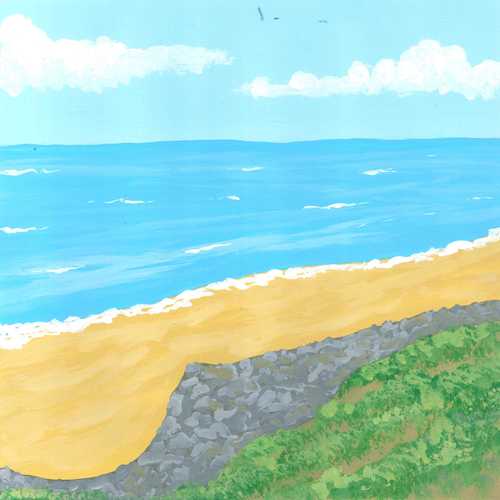
Forest bathing soundscapes, Hebridean Waves, and success for Indigenous S. Americans | Newsletter #33
¿Cómo estás*, friend? 👋
What does it sound like on a beach in the Scottish Inner Hebrides? How can biodiversity be incentivized? Can damaged land heal itself? What triumphs and losses are currently being experienced by Indigenous peoples in South America?
Read on to find out.
*“How are you?” in Spanish.
Soundscape of the week
🦅 ‘Lesser Kestrels Took Over an Abandoned Building’:
“Every evening the lesser kestrels […] would start roosting in […] nesting boxes placed by local bird experts to increase […] breeding success. The sounds of their squeaky calls echo in this abandoned place, where human[s are] […] no longer found and wildlife thrives.”
Nesting colonially at an old holiday complex, this raptor species – which primarily migrates between Central/Southern Africa and Southern Europe and Eurasia – fills the air with smooches, hisses, rasps, whistles, and chittering, along with the occasional beating of wings. These uncannily compelling vocalizations come courtesy of Axel and Ario Drioli’s Sounding Wild project.
Articles and essays
🌲 “Step into a world of tranquility and rejuvenation with our specially curated playlist of high-quality nature sounds from the heart of lush forests. In today’s fast-paced society, it’s easy to lose touch with the natural world and forget the positive impact it has on our well-being. By immersing yourself in the soothing melodies of the great outdoors, you can enjoy a plethora of benefits for your body, mind, and soul.”
Allow us to introduce you to earth.fm’s Forest Bathing playlist, which assembles soundscapes from around the world, including the Philippines and Malaysia, Nepal, South America, Estonia, and Ireland. Also included is a breakdown of the four benefits of forest bathing: reduced stress and anxiety; enhanced focus and concentration; improved quality of sleep; and boosted creativity and inspiration.
🌊 With ‘Gentle Waves’, earth.fm podcast Wind Is the Original Radio is once again delighted to welcome back established author and wildlife recordist Roger Boughton. Join him as he snuggles down in the lee of a sand dune to “listen to the waves caressing” Balnahard Beach on the Scottish Hebridean island of Colonsay, while the roar of the Atlantic Ocean “crash[es] about on some skerries” in the background.
While “watching the world go by and quietly falling asleep in the sunshine”, he is joined by a rock pipit and a ringed plover, and discusses a shipwreck on the beach and the abbey on the neighboring island of Iona, the former home of Irish abbot, evangelical missionary, and alleged “water beast”-banisher St. Columba.
Additional episodes of Wind Is the Original Radio are available on Apple and Google podcasts, Spotify, and Stitcher, with new installments featuring soundscape recordings released every Friday.

From the extended community
🌎 ‘Peru: “Genocide Bill” Scrapped as Indigenous People Claim Victory’: in a rare triumph for Indigenous peoples in South America, Bill No. 3518/2022-CR – “a naked land grab by the oil and gas industry” – has been blocked from progressing through the Peruvian Congress. Had it passed into law, this legislation “would have been catastrophic for uncontacted tribes in Peru – they’d have been left utterly exposed to the oil and gas corporations who’ve targeted their lands and resources for generations. All their rights would have been stripped away, and many would very probably have been wiped out.”
However, it remains necessary to stay alert to similar tactics being deployed both in Peru and elsewhere. In Brazil, the country’s Chamber of Deputies (the lower house of the National Congress) has approved legislation which, should it become law, will “be the kiss of death for the first peoples of Brazil and the highly biodiverse territories they protect in the Amazon and beyond”; “a very nasty wake-up call” for those who hoped that the ousting of Bolsonaro also constituted the defeat of ruthless agribusiness in the region.
👉 Take action here.
🌳 “I’m […] intrigued by how much faster and more efficiently we could find solutions to our many problems if we got our advice from the natural kingdom who of course is wise beyond our years…”
In ‘Our Job Is to Give Nature a Helping Hand’, writer and photographer Olivia Sprinkel considers co-creating with nature, including both allowing damaged land the opportunity to heal itself – including 10,000 acres of degraded farmland in Costa Rica, which was “[shat] back to life” by birds when it was fenced off for 20 years – as well as more targeted rewilding strategies.
💚 “Confidence in nature-based solutions remains low […]. But trees and nature are not the problem. The problem is our misuse of them, which stems from the same issue we have always had: Financial systems that value any single part of nature […] over others will always risk incentivizing the oversimplification of biodiversity.”
‘Healthy Biodiversity Is the Reason to Fight Climate Change’: writing for Time, Thomas Crowther – professor of ecology and founder of Restor, a global network of restoration and conservation sites – uses the example of fungi species in a petri dish to illustrate the importance of biodiversity. When just two fungi species compete, one will defeat the other, causing “the system [to] collapse”. However, as more species are added, “the greater the chances that all [of those] species survive”.
In microcosm, this demonstrates the ecological mechanism “by which diversity begets diversity in natural systems”, creating a “network of interactions […] where every species needs other species [in order to] survive”. This is as true for us as for fungi in a laboratory. However, “by building markets to promote the capture of carbon in natural systems”, we are being “incentivized to plant monocultures of fast-growing trees […] at the expense of everything else”. “Instead, we need economic systems that value the full complexity of nature and [of] […] human wellbeing.”
👉 Follow us on Twitter for a daily dose of nature-sound inspiration!
How to support earth.fm
All 600+ of our curated, immersive soundscapes are free to listen to, but if you want to help us grow new forests, please become a supporter!
There are three options available, and you will also be able to favorite recordings, create and share playlists, and many other perks – plus a big surprise is coming exclusively to members in the next few weeks!
Until next time, we wish you a regenerative week. 🙏
With best wishes,
Neil and Team earth.fm
Reach out on hello@earth.fm 👋
Forward this newsletter to anyone who would appreciate it ✉️
Join the conversation with the Earth.fm community 🤝
Submit a recording 🎤
Follow us on Twitter. Instagram and YouTube 💻
Listen to nature sounds in your browser by installing our free extension 🎧
Earth.fm is a completely free streaming service of 800+ nature sounds from around the world, offering natural soundscapes and guided meditations for people who wish to listen to nature, relax, and become more connected.
Check out our recordings of nature ambience from sound recordists and artists spanning the globe, our thematic playlists of immersive soundscapes and our Wind Is the Original Radio podcast.
You can join the earth.fm family by signing up for our newsletter of weekly inspiration for your precious ears, or become a member and not only enjoy extra earth.fm features and goodies but help us grow new forests on our beloved planet.
